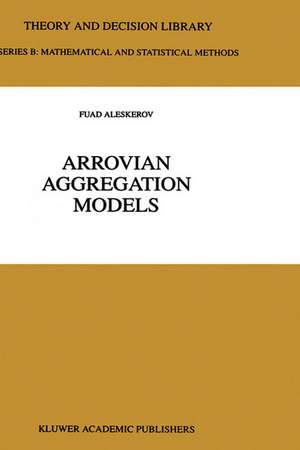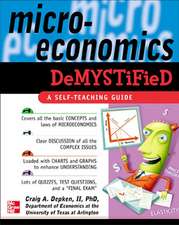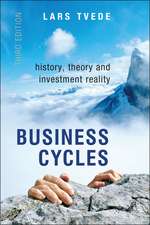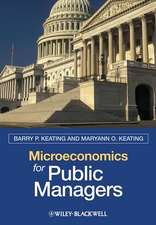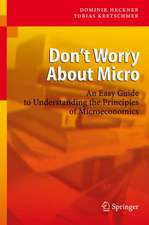Arrovian Aggregation Models: Theory and Decision Library B, cartea 39
en Limba Engleză Hardback – 31 mar 1999
Remaining within the framework of the axiomatic approach and based on the consideration of local rules, Arrovian Aggregation Models investigates three formulations of the aggregation problem according to the form in which the individual opinions about the alternatives are defined, as well as to the form of desired social decision. In other words, we study three aggregation models. What is common between them is that in all models some analogue of the Independence of Irrelevant Alternatives condition is used, which is why we call these models Arrovian aggregation models.
Chapter 1 presents a general description of the problem of axiomatic synthesis of local rules, and introduces problem formulations for various versions of formalization of individual opinions and collective decision. Chapter 2 formalizes precisely the notion of `rationality' of individual opinions and social decision. Chapter 3 deals with the aggregation model for the case of individual opinions and social decisions formalized as binary relations. Chapter 4 deals with Functional Aggregation Rules which transform into a social choice function individual opinions defined as choice functions. Chapter 5 considers another model &endash; Social Choice Correspondences when the individual opinions are formalized as binary relations, and the collective decision is looked for as a choice function. Several new classes of rules are introduced and analyzed.
| Toate formatele și edițiile | Preț | Express |
|---|---|---|
| Paperback (1) | 638.57 lei 6-8 săpt. | |
| Springer Us – 7 dec 2010 | 638.57 lei 6-8 săpt. | |
| Hardback (1) | 644.82 lei 6-8 săpt. | |
| Springer Us – 31 mar 1999 | 644.82 lei 6-8 săpt. |
Din seria Theory and Decision Library B
-
 Preț: 389.31 lei
Preț: 389.31 lei - 18%
 Preț: 1234.46 lei
Preț: 1234.46 lei - 18%
 Preț: 1828.60 lei
Preț: 1828.60 lei - 18%
 Preț: 949.42 lei
Preț: 949.42 lei - 18%
 Preț: 1227.04 lei
Preț: 1227.04 lei - 18%
 Preț: 1228.62 lei
Preț: 1228.62 lei - 18%
 Preț: 1829.05 lei
Preț: 1829.05 lei - 18%
 Preț: 1229.73 lei
Preț: 1229.73 lei -
 Preț: 389.88 lei
Preț: 389.88 lei - 18%
 Preț: 1226.11 lei
Preț: 1226.11 lei -
 Preț: 397.97 lei
Preț: 397.97 lei - 18%
 Preț: 955.56 lei
Preț: 955.56 lei - 18%
 Preț: 952.89 lei
Preț: 952.89 lei -
 Preț: 386.99 lei
Preț: 386.99 lei - 18%
 Preț: 1222.17 lei
Preț: 1222.17 lei -
 Preț: 389.88 lei
Preț: 389.88 lei - 15%
 Preț: 648.05 lei
Preț: 648.05 lei - 18%
 Preț: 949.42 lei
Preț: 949.42 lei - 15%
 Preț: 475.80 lei
Preț: 475.80 lei - 18%
 Preț: 1544.95 lei
Preț: 1544.95 lei - 15%
 Preț: 647.59 lei
Preț: 647.59 lei - 18%
 Preț: 958.25 lei
Preț: 958.25 lei -
 Preț: 381.81 lei
Preț: 381.81 lei - 18%
 Preț: 953.82 lei
Preț: 953.82 lei -
 Preț: 394.51 lei
Preț: 394.51 lei -
 Preț: 387.75 lei
Preț: 387.75 lei - 18%
 Preț: 1226.24 lei
Preț: 1226.24 lei - 15%
 Preț: 646.75 lei
Preț: 646.75 lei - 15%
 Preț: 642.03 lei
Preț: 642.03 lei - 18%
 Preț: 744.53 lei
Preț: 744.53 lei - 18%
 Preț: 1229.58 lei
Preț: 1229.58 lei
Preț: 644.82 lei
Preț vechi: 758.60 lei
-15% Nou
Puncte Express: 967
Preț estimativ în valută:
123.39€ • 127.29$ • 102.97£
123.39€ • 127.29$ • 102.97£
Carte tipărită la comandă
Livrare economică 26 martie-09 aprilie
Preluare comenzi: 021 569.72.76
Specificații
ISBN-13: 9780792384519
ISBN-10: 0792384512
Pagini: 260
Ilustrații: XII, 244 p.
Dimensiuni: 155 x 235 x 20 mm
Greutate: 0.54 kg
Ediția:1999
Editura: Springer Us
Colecția Springer
Seria Theory and Decision Library B
Locul publicării:New York, NY, United States
ISBN-10: 0792384512
Pagini: 260
Ilustrații: XII, 244 p.
Dimensiuni: 155 x 235 x 20 mm
Greutate: 0.54 kg
Ediția:1999
Editura: Springer Us
Colecția Springer
Seria Theory and Decision Library B
Locul publicării:New York, NY, United States
Public țintă
ResearchCuprins
1 Aggregation: A General Description.- 2 Rationality of Individual Opinions and Social Decisions.- 3 Social Decision Functions.- 4 Functional Aggregation Rules.- 5 Social Choice Correspondences.
Recenzii
`This monograph is excellent and should belong to every social choice theorist's library. it is also highly recommended to mathematicians working in discrete mathematics since it offers many applications of this mathematical domain.' Mathematical Reviews, 2001c
